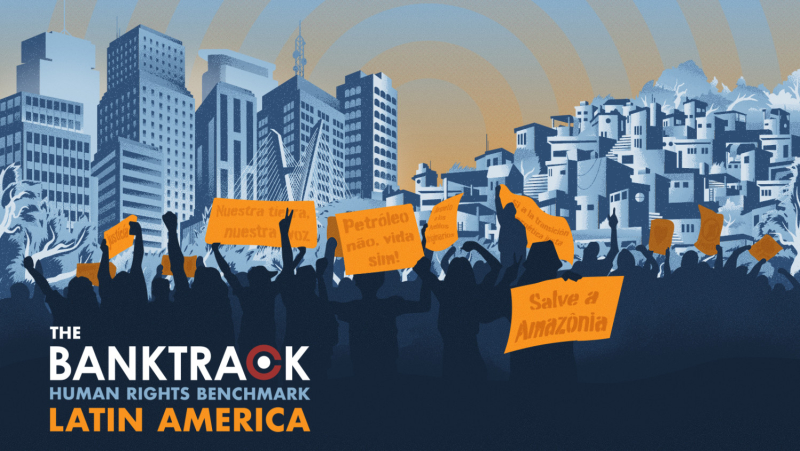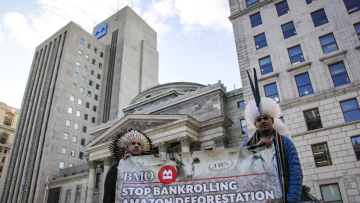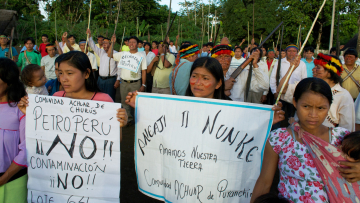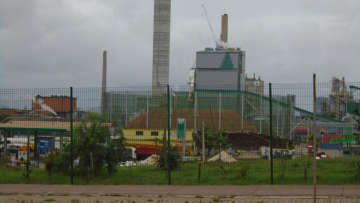New benchmark from BankTrack shows Latin American banks falling short on human rights
Ryan Brightwell, Human Rights Lead, BankTrack: ryan@banktrack.org

Ryan Brightwell, Human Rights Lead, BankTrack: ryan@banktrack.org
Translated versions of this report are now available to download in Spanish and Portuguese.
Las versiones traducidas ya están disponibles para descargar en español y portugués.
Versões traduzidas já estão disponíveis para download em espanhol e português.
Most Latin American banks are meeting fewer than half of their responsibilities under the UN Guiding Principles on Business and Human rights (UNGPs). This is the key finding of a new regional benchmark of the human rights policies, processes and reporting of 17 of the largest banks in Latin America, published today by BankTrack. The Benchmark covers banks headquartered in Brazil, Mexico, Colombia, Chile, Peru and Argentina, as well as subsidiaries of international banks.
The report categorises banks as “leaders”, “moderate achievers”, “followers” or “laggards”, depending on their scores out of 14 criteria, closely modelled on the requirements of the UNGPs. These criteria cover topics including banks’ human rights policy commitments, their elaboration of a due diligence process, their reporting and establishment of channels and procedures for remediating human rights impacts linked to their finance.
No bank was assessed as a “leader”. Only one bank, BBVA México, was ranked in the “moderate achievers” category, with a score of 7 out of 14. (1) All others received less than half of the available points. This resulted in an average score of 3.4 out of 14 for these 17 banks. The UN Guiding Principles set out minimum standards of corporate behaviour, which the results show all banks are failing to meet. See the summary table of results below.
“In a region marked by serious human rights violations, it is regrettable to see that those who are the major financiers of business activities still lack a serious commitment to effective human rights due diligence. BankTrack's results reveal the huge gap in corporate responsibility that we still have in our region and are an important tool for Latin American civil society to continue pressuring financial institutions for real commitments to human rights", commented Fernanda Pinheiro, Advisor of Development and Socio-Environmental Rights at Brazilian human rights organisation Conectas.
Key findings include:
- All but one of the banks benchmarked address human rights in their policies or reporting to some extent. Among the 17 banks benchmarked, only Banco de la Nación Argentina had no statement or policy addressing human rights.
- However, in practice, banks’ commitments rarely translate into comprehensive human rights due diligence processes. Only four banks – BBVA México, Bradesco, Citibanamex and Santander — have in place a comprehensive and ongoing human rights due diligence process that extends across the entire business operations.
- None of the banks produced human rights reporting that addressed their main human rights impacts, or demonstrated how the bank is actively mitigating an identified impact. Rather, where banks reported at all on human rights, this only covered internal human rights policy developments such as development of new policies and training.
- None of the banks have established or participated in an effective grievance mechanism for those adversely impacted by their finance. And only five out of the 17 banks make any clear commitment to providing for or cooperating in the remediation of adverse human rights impacts to which they have caused or contributed.
“Banks’ human rights commitments appear to serve more as image-building strategies for the benefit of investors and clients, rather than genuine efforts to address adverse human rights impacts for the benefit of affected communities”, said BankTrack’s Inés Racionero Gómez. “Claims to respect human rights need to be supported by the implementation of concrete actions and processes oriented to the result of preventing, mitigating and addressing negative impacts on human rights”.
The Benchmark covers banks headquartered in Brazil, Mexico, Colombia, Chile, Peru and Argentina, as well as subsidiaries of international banks. It forms the latest part of BankTrack’s Human Rights Benchmark report series, and is its third regional benchmark, after similar reports covering banks in Africa and Asia. (2) BankTrack will produce a new update of its global Human Rights Benchmark, evaluating 50 of the world’s largest commercial banks, before the end of 2024.
This Benchmark follows a new report from the UN Working Group on Business and Human Rights titled “How to integrate Human Rights in Finance in Latin America and the Caribbean”, which includes recommendations for action for states, investment institutions and commercial banks in this region.
Download the BankTrack Human Rights Benchmark Latin America here.
Descargue aquí el BenchTrack de Derechos Humanos de América Latina de BankTrack.
Baixe aqui o Benchmark de Direitos Humanos do BankTrack na América Latina.
View the launch webinar
BankTrack held a webinar to present the Benchmark's methodology and results on Tuesday 26th March. View here on YouTube.
End notes
(1) The “moderate achievers” category corresponds to the category of “front runners” in earlier benchmarks in this series. The category has been renamed to better reflect the level of implementation achieved by banks in this scoring bracket.
(2) See previous Global and Regional Human Rights Benchmarks at https://www.banktrack.org/hrbenchmark.
Summary table of results




